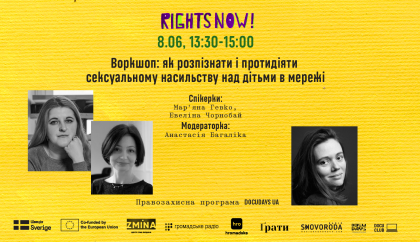
The internet has become a familiar setting where sexual violence begins and occurs, through gaming chats, comment sections, calls, or messaging on social media. At first glance, it may not show clear signs of a crime, often disguised by manipulation and artificially constructed feelings of intimacy, flirtation, or friendship. Yet, when it happens in the digital space, such violence can be just as harmful as in the offline world.
During the workshop, held as part of the nationwide information campaign Sexual Violence on the Internet: How to Protect Children, we will examine the issue through psychology and law, review practical cases, and explain how to recognise risks and respond effectively. We’ll also discuss how to talk to children about this sensitive topic and how to become a source of support and trust for them.
What are the specifics of online sexual violence? How do perpetrators operate, and why are children not always able to resist them? What forms of liability are provided for under Ukrainian law? And ultimately, what can each of us do to help ensure the safety of children?
Speakers:
Mariana Hevko, psychologist and expert in the Sexual Violence on the Internet: How to Protect Children information campaign
Evelina Chornobai, lawyer at the NGO La Strada – Ukraine
Moderator:
Anastasia Bahalika, journalist and director of the Human Rights Department at the NGO Docudays
Where: “Sweet Life” Hall, “Zhovten” Cinema, 26 Kostiantynivska Street
When: Sunday, June 8, 2025 at 1:30 PM
Admission: Free
Organisers: NGO Docudays, The Docuclub Network
The issue of online sexual violence — particularly sextortion — is highlighted in the film My Sextortion Diary by Spanish director Patricia Franquesa, featured in this year’s film program. The film will be screened in the Special Events section on June 7 and 11 at Zhovten Cinema.
The development of the DOCU/CLUB Network is funded by the Embassy of Sweden in Ukraine and the National Endowment for Democracy (NED).
The opinions, conclusions or recommendations do not necessarily reflect the views of respective governments or charitable organizations of these countries. The author(s) of this publication are solely responsible for its content.



